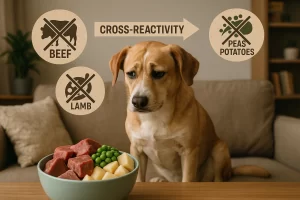A chicken allergy in dogs is one of the most common food sensitivities among our furry companions. For many dogs, chicken can trigger allergic reactions, leading to discomfort and health problems. Understanding how to manage this allergy, including what to avoid and the best alternatives to use in their diet, is crucial for maintaining your dog’s health and well-being.
What Is a Chicken Allergy in Dogs?
A chicken allergy occurs when a dog’s immune system reacts negatively to proteins found in chicken meat. This immune response can lead to a variety of symptoms, including skin irritation, gastrointestinal upset, and ear infections. Unlike food intolerance, which affects digestion, an allergy involves the immune system and can cause long-term health issues if not managed properly.
Signs of a Chicken Allergy in Dogs
Identifying a chicken allergy in dogs can be tricky, as the symptoms can resemble other health issues. Some common signs include:
- Itchy skin (especially around the face, paws, and ears)
- Ear infections
- Vomiting or diarrhea
- Hair loss or dry, flaky skin
If your dog shows any of these symptoms after consuming chicken, it’s important to consult your veterinarian for a proper diagnosis and treatment plan.
Ingredients to Avoid in Chicken-Allergic Dogs
If your dog is allergic to chicken, it’s crucial to avoid certain ingredients that contain chicken or chicken-based products. Here’s a list of common ingredients you should be cautious of:
1. Chicken Meat
The most obvious ingredient to avoid is chicken meat itself. This includes fresh chicken, as well as frozen or dried chicken products.
2. Chicken By-Products
Chicken by-products can include leftover parts like feathers, beaks, and other animal parts. These are processed and may still contain proteins that could trigger allergic reactions in dogs.
3. Chicken Meal
Chicken meal is a concentrated form of chicken that includes meat, bones, and organs. It can still contain chicken proteins, which may be problematic for dogs with chicken allergies.
4. Chicken Fat
Although chicken fat is used in many dog foods for flavor and nutritional value, it may also contain trace amounts of chicken proteins, which can still cause allergic reactions.
5. Chicken Broth
Some commercial dog foods use chicken broth to enhance the flavor of the food. If your dog has a chicken allergy, it’s best to avoid foods that list chicken broth as an ingredient.
What to Use Instead of Chicken
If your dog is allergic to chicken, it’s important to replace it with protein sources that are both nutritious and safe. Here are some great alternatives:
1. Turkey
Turkey is a lean protein that is often well-tolerated by dogs with chicken allergies. It provides a similar nutritional profile without the risks associated with chicken.
2. Lamb
Lamb is another excellent alternative to chicken. It’s a novel protein for many dogs, which means they are less likely to have an allergic reaction to it.
3. Beef
Beef is a common protein source, but it’s important to note that some dogs may also be allergic to it. If your dog isn’t allergic to beef, it can serve as a great substitute for chicken in their diet.
4. Fish (Salmon, Whitefish)
Fish is rich in omega-3 fatty acids and can be a great alternative to chicken. Salmon, in particular, is often used in hypoallergenic dog foods due to its low allergenic properties.
5. Duck
Duck is another novel protein that is generally well-tolerated by dogs with chicken allergies. It’s a good source of protein and is often found in limited-ingredient dog foods.
6. Venison
Venison is a lean, nutrient-rich protein that is a great option for dogs with chicken allergies. Since venison is less common in dog food, it’s less likely to cause an allergic reaction.
Transitioning Your Dog to a Chicken-Free Diet
When switching your dog to a chicken-free diet, it’s important to transition gradually to avoid digestive upset. Start by mixing the new food with your dog’s current food, gradually increasing the proportion of the new food over a period of 7-10 days. This slow transition will help your dog’s digestive system adjust to the new diet.
Consulting Your Veterinarian
If you suspect your dog has a chicken allergy, it’s important to consult with your veterinarian. Your vet can help confirm the allergy, recommend appropriate dietary changes, and monitor your dog’s progress. They may suggest an elimination diet or food trials to identify other potential allergens in your dog’s food.
Conclusion: Keeping Your Dog Healthy with the Right Diet
Managing a chicken allergy in dogs is essential for preventing discomfort and long-term health issues. By avoiding chicken and chicken-based ingredients, and replacing them with safe, high-quality protein alternatives like turkey, lamb, or fish, you can help your dog live a healthy and happy life. Always work closely with your veterinarian to ensure your dog’s diet is properly balanced and allergen-free.



